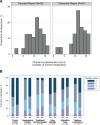Interactive or static reports to guide clinical interpretation of cancer genomics
- PMID: 29315417
- PMCID: PMC6018970
- DOI: 10.1093/jamia/ocx150
Interactive or static reports to guide clinical interpretation of cancer genomics
Abstract
Objective: Misinterpretation of complex genomic data presents a major challenge in the implementation of precision oncology. We sought to determine whether interactive genomic reports with embedded clinician education and optimized data visualization improved genomic data interpretation.
Materials and methods: We conducted a randomized, vignette-based survey study to determine whether exposure to interactive reports for a somatic gene panel, as compared to static reports, improves physicians' genomic comprehension and report-related satisfaction (overall scores calculated across 3 vignettes, range 0-18 and 1-4, respectively, higher score corresponding with improved endpoints).
Results: One hundred and five physicians at a tertiary cancer center participated (29% participation rate): 67% medical, 20% pediatric, 7% radiation, and 7% surgical oncology; 37% female. Prior to viewing the case-based vignettes, 34% of the physicians reported difficulty making treatment recommendations based on the standard static report. After vignette/report exposure, physicians' overall comprehension scores did not differ by report type (mean score: interactive 11.6 vs static 10.5, difference = 1.1, 95% CI, -0.3, 2.5, P = .13). However, physicians exposed to the interactive report were more likely to correctly assess sequencing quality (P < .001) and understand when reports needed to be interpreted with caution (eg, low tumor purity; P = .02). Overall satisfaction scores were higher in the interactive group (mean score 2.5 vs 2.1, difference = 0.4, 95% CI, 0.2-0.7, P = .001).
Discussion and conclusion: Interactive genomic reports may improve physicians' ability to accurately assess genomic data and increase report-related satisfaction. Additional research in users' genomic needs and efforts to integrate interactive reports into electronic health records may facilitate the implementation of precision oncology.
Figures




References
-
- Garraway LA. Genomics-driven oncology: framework for an emerging paradigm. J Clin Oncol. 2013;3115:1806–14. - PubMed
-
- Le Tourneau C, Delord JP, Goncalves A et al. , Molecularly targeted therapy based on tumour molecular profiling versus conventional therapy for advanced cancer (SHIVA): a multicentre, open-label, proof-of-concept, randomised, controlled phase 2 trial. Lancet Oncol. 2015;16:1324–34. - PubMed
Publication types
MeSH terms
Grants and funding
LinkOut - more resources
Full Text Sources
Other Literature Sources

